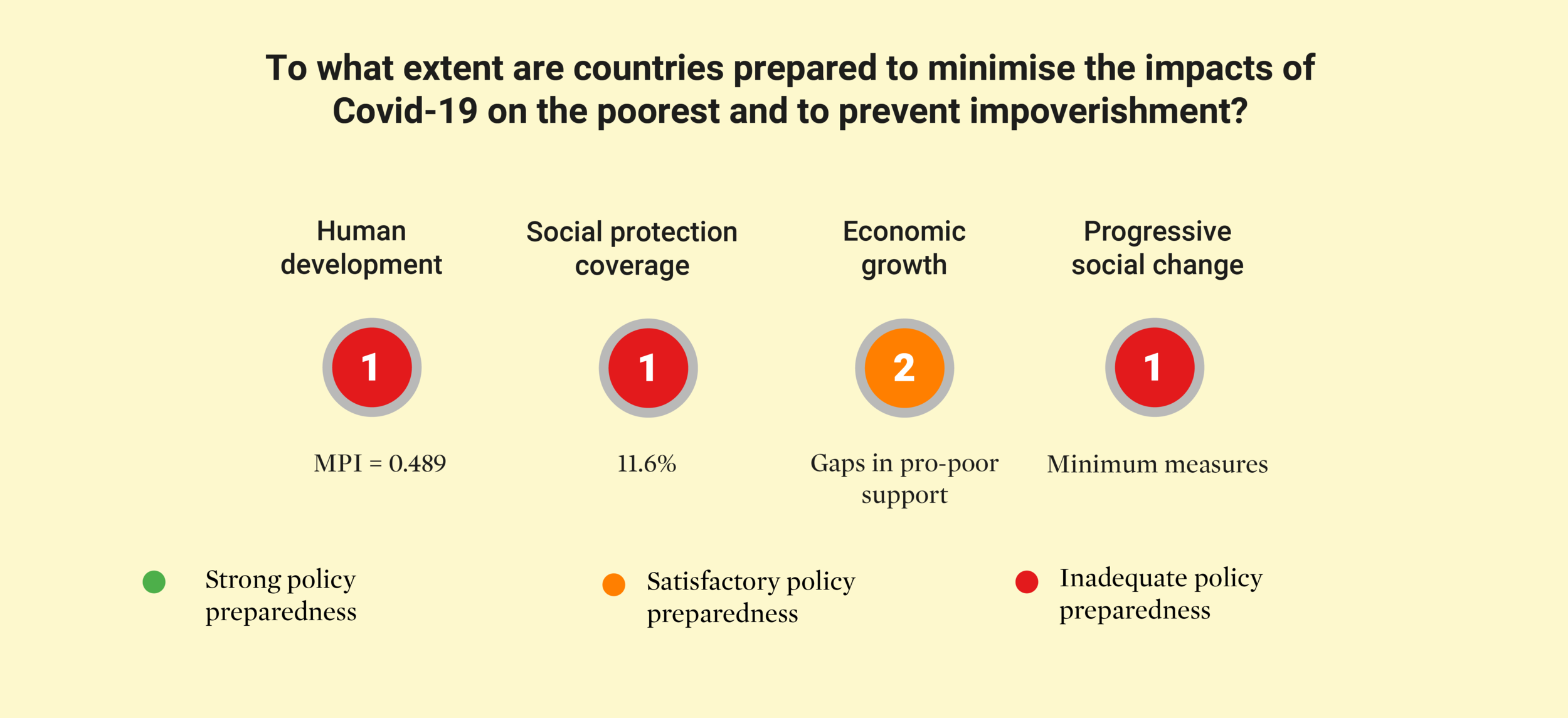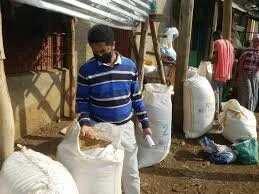Thank you for visiting our new Covid-19 Poverty Monitor. To find out more about the project, visit our blog about the project.
Areas of concern for the poorest and potential impoverishment
Market disruptions: Market closures and transportation restrictions to prevent the spread of Covid-19 were the most widely cited challenge identified by respondents. These disruptions were associated with an increase in the cost of staple goods, lost livelihoods for those selling to these markets, and challenges in accessing agricultural inputs such as fertiliser and seeds.
“[The lockdown] affected us a lot. Our life depends on extensive movement to get our needs met. If the lockdown continued, the economic problem would kill more than the pandemic. it was tough.” Male respondent, Amhara
“The prices for [farm] inputs have increased, and if you must worry, it begins with the cost of improved [seed] varieties and fertiliser. They are increasing at an unprecedented rate.” Male respondent, Oromia
Lost livelihoods: Market closures have resulted in lost income for farmers, small businesses and casual day labourers. Limitations on meeting in groups disrupted labour sharing activities related to harvest and resulted in crop losses. Restrictions on the limit of passengers on public transportation have further limited movement for employment and the cost of transportation has increased significantly in all three regions.
“Previously farmers work in a team and support each other during harvest seasons. They collected harvest in ‘debo’ [labour-sharing] but now due to the disease they can’t work together so it became difficult to collect the harvest in time. There was untimely rain during harvesting which necessitated mobilising labour to save the harvest before it got ruined by rain. However, due to Covid-19 people couldn’t work together to harvest their produce and save it from the rain.” Key Informant, Oromia
“We were unable to travel to other areas for paid labour. We depend on agriculture.” Male respondent, Amhara
Increased costs of staple goods: All respondents reported increased costs of staple goods, particularly food and transportation. Increases in costs varied, with some goods reported to cost five times more than before the pandemic.
“The main impact was on the price of food items. For example, a quintal of teff (grain) increased from birr 2,500 ($59.85) to 4,000 ($95.75) after Covid-19.” Male respondent, Amhara
Additional costs of food staples combined with reduced income are causing households to reduce daily meals and threaten food security. Many households interviewed said they eat one meal per day less than before the pandemic or alternate their diets to limit costlier food products. Some households reported skipping meals for an entire day. Agricultural households in all three regions report donating food to the kebele (neighbourhood) to support households in need, though many of the same households received transfers themselves.
The interaction of climate change and market disruptions has exacerbated food insecurity for several households across the three sampled regions. Recurrent droughts and locusts have led to lower agricultural yields in recent years, leading some households to rely more on food purchases. With increased food prices and lost livelihoods, food security has become an ever more pressing concern.
“The poorest who do not have necessary items and dependent on daily subsistence [have been most affected]. About 600 households did not have enough food for immediate consumption. We organised the community to contribute grain to support the poorest. It was not enough.” Key informant, Amhara
“My household received support of birr 900 ($21.54) per month for six months to cover our food deficit. I also gave birr 200 ($4.79) and 2kg of maize to the kebele to support people who were affected due to Covid-19 at the woreda (district) level. From this collected support at woreda level, the woreda provided me one-time 30kg of grain to reduce the impact of Covid-19 on my household food security.” Male respondent, Southern Nations, Nationalities and People’s Region (SNNP)
“We used what [food] we had in limited amounts. We stopped using salt, oil and other ingredients. We reduced quantity and quality. We had to eat two times instead of three during the Covid-19 period.” Male respondent, Amhara
Many respondents report disruptions to social relationships and a decline in social cohesion, particularly affecting informal support networks, the ability to attend cultural events and to gather for weddings and funerals. A number of respondents identified these support networks as being critical to their wellbeing, noting material and psychological strains due to disruptions.
“As per our culture, people contribute grain or money to support those in need or those who faced accident/shock. Now everybody is needy, and it is difficult to support each other.” Key informant, Amhara
“During the lockdown, we didn’t visit each other during religious holidays such as Arafa, moulid [Arafa and Mawlid]. We stopped to gather together for marriage, attend funerals and so on. We all were limited to the home. However, now (after the end of the lockdown) things have improved, and we begin to attend different social events.” Male respondent, SNNP
Schools were closed across Ethiopia on 16 March 2020. School reopening was permitted in October 2020 guided by Directive No.30/2020. However, reopening and implementation of preventative measures in schools have varied based on a school’s readiness to meet the required precautions stated in the directive. Communities sampled are rural with poor facilities. As a result, most of the directives were not observed – some students have only received one facemask, social distancing is not being followed and classrooms as full as they used to be.
“One of my children refused to return to school, but I am lobbying him, almost begging him to return to school as he mentions issues related to books and other materials. I have told him that I will solve all his problems if he returns. He does not have an interest in education, he says what benefits would I get. He would have joined 8th grade this year.” Male respondent, Oromia
Sectors most affected by containment measures
Social protection through the Productive Safety Net Programme [PSNP] was a key source of financial and food support for eligible households before and during the pandemic. However, the level of support was considered inadequate to support households to cope with the economic disruptions caused by the pandemic. Beyond PSNP, no other government support to mitigate the impacts of Covid-19 was identified.
“There is no support given to the community in which I am working in.” Key Informant, Oromia
Neighbourhood support networks were set up in all three regions to facilitate access to staple goods. Households took turns going to the market to purchase food and other basic goods for their neighbourhood and households were asked to donate food and money to the woreda (neighbourhood) for food-insecure households.
“The kebele has facilitated the contribution of food and money from the community members that were collected at the woreda level. Then the woreda redistributed the money and the food back to the most vulnerable groups of the community in each kebeles of the woreda. In one kebele about 200 poor, daily labourers and elders got support for maize and sorghum. The support was given three times. The quota was 15kg per individual in the household.” Key informant, SNNP
Loans and sale of assets: Some households report taking loans from other community members or selling assets to maintain basic consumptions needs. One respondent reported selling an ox and another reported sell grazing land, both significant assets for their households’ livelihoods.
Health insurance was cited by many respondents as an urgent need to address Covid-19 and non-Covid-19 health risks. Those with access to health insurance cited this as a crucial benefit to their household. Despite being eligible, many respondents reported being unable to access health insurance due to the prohibitive cost of the insurance premium. One respondent who did have health insurance reported being unable to pay for his mother’s medication which was not covered, ultimately leading to her death.
“We pay birr 250 ($5.98) per household for the [health insurance] premium. It has benefited us a lot because whenever a household member gets sick, we can use that immediately. We do not worry about the payment. I have benefited from the scheme when I was sick a few months ago. My husband has also benefited from the same service.” Female respondent, Oromia
“They told me the health insurance from my community does not make her eligible for free medication. They asked for birr 20,000 ($478.77) but I could not afford it. I returned home to borrow money from relatives in my community. It took some time, and sadly, my mother died in between.” Male respondent, Amhara
Methodology
CPAN Covid-19 Poverty Monitor bulletins are compiled using a combination of original qualitative data collection from a small number of affected people in each country, interviews with local leaders and community development actors, and secondary data from a range of available published sources. Interviews for this bulletin were conducted between 29 December 2020 and 25 February 2021 in Amhara (eight households, two key informants), Oromia (five households, two key informants) and Southern Nations, Nationalities and People’s Region (SNNP) (eight households, two key informants).
Key external sources
To find out more about the impacts of Covid-19 on poverty in Nepal, please explore the following sources that were reviewed for this bulletin:
This project was made possible with support from Covid Collective.
Supported by the UK Foreign Commonwealth and Development Office (FCDO), the Covid Collective is based at the Institute of Development Studies (IDS). The Collective brings together the expertise of, UK and Southern-based research partner organisations and offers a rapid social science research response to inform decision-making on some of the most pressing Covid-19 related development challenges.
















CMI